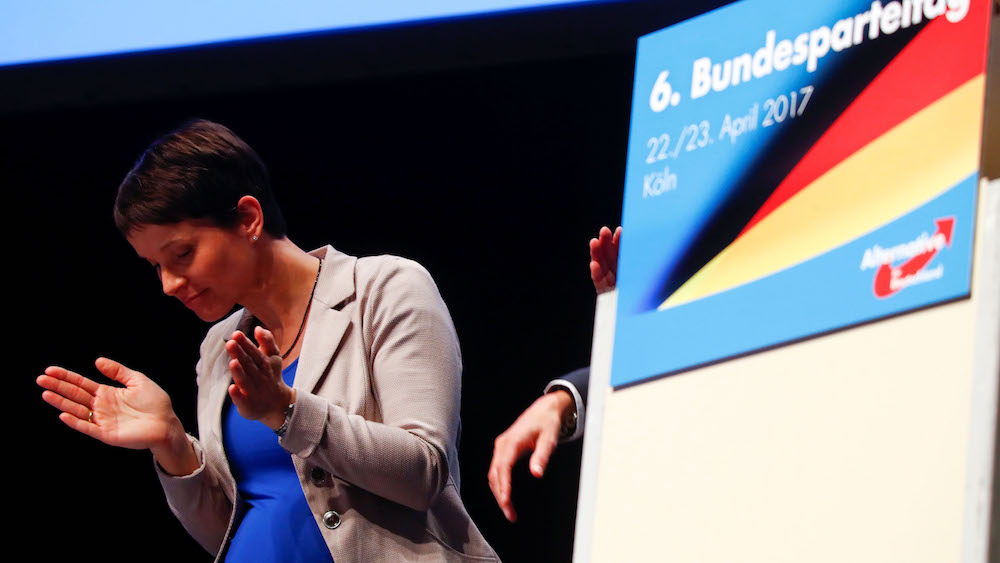Since the Brexit vote and Donald Trump’s election, populist parties seem to have lost some momentum in Europe. Front National may have done well in the first round of the French presidential election, but Germany’s AfD is clearly declining. The difference is in the leadership.
On April 23, Germany’s right-wing populist party, the Alternative für Deutschland (AfD), was far too busy to spend much time looking at France. In the West German city of Cologne, delegates met for the final round of a two-day party congress, quarreling over their candidates and their program for the federal elections scheduled for September.
They might have done better to pay more attention to the French election campaign. There, Marine Le Pen, leader of the right-wing Front National, received 21.4 percent of the vote and made it to the second round of France’s presidential elections.
Le Pen may not have done quite as well as she had hoped. Her chances of becoming president in the run-off on May 7 are slim. Nevertheless, she is much more successful than the AfD – under present circumstances – can ever hope to be.
The difference between the two parties is due to Le Pen’s superior leadership and strategic thinking. Very briefly: where the AfD is, bit by bit, turning more nationalistic, more xenophobic, and more revisionist about German history, the Front National has managed to soften its tone and broaden its appeal to conservative voters beyond the extreme right-wing fringes while still catering to hardliners.
Let’s have a closer look at the AfD‘s brief history. In 2013, at the height of the euro crisis and the debate about covering for Greece’s huge public debt, the Alternative für Deutschland was founded by a group of economics professors led by Bernd Lucke, an eloquent academic from Hamburg.
The original AfD disagreed with Chancellor Angela Merkel’s policy of keeping Greece in the euro zone, but neither questioned the euro itself nor Germany’s membership in the European Union. As a party of market-oriented, socially conservative middle class people, it had a hugely successful start and barely missed getting into the Bundestag in 2013.
As Greece’s public finances faded from the headlines, the party’s fortunes waned. At the same time, the influence of more nationalist and right-wing politicians within the AfD increased. In 2015, when Merkel opened Germany’s borders to nearly a million refugees, the Alternative für Deutschland changed its focus and transformed into an anti-Muslim, right-wing movement.
Petry’s Moment
This was the moment that Frauke Petry, a smart and power-hungry entrepreneur from Saxony, enlisted the help of the party’s radicals to oust Bernd Lucke from power. With a majority of Germans deeply worried about the country’s capacity to cope with a massive influx of refugees, the AfD soared in the polls.
Now, however, the refugee crisis seems to be over – and once again, the AfD is declining in the polls. At the party congress in Cologne, history was being replayed as Petry was shouldered aside by the same right-wing groups that she had used to get rid of Lucke two years earlier.
It is now Alexander Gauland, a 76-year old lawyer and conservative writer with a long, middle-ranking carrier in Merkel’s CDU party behind him, who holds the real power in this party. With him, there is no doubt that the AfD is moving closer to neo-Nazi ideology. It was Gauland, after all, who most prominently defended his colleague Björn Höcke’s attacks on Germany’s Holocaust remembrance.
Where Frauke Petry failed, Marine Le Pen succeeded: After ousting her own father Jean-Marie Le Pen, the founder of the Front National, she managed to curb some of the party’s worst anti-Semitic and anti-Muslim rhetoric. Playing on French national pride as well as on fear of globalization, Marine Le Pen has been able to reach out to mainstream voters who would never have voted for her father. Interestingly, her support is particularly strong among the young.
In contrast, the AfD has boxed itself into the extreme right-wing corner. Le Pen is expected to receive more than a third of the votes in the second round of France’s presidential elections on May 7, but the AfD is stuck around ten percent or less. It has no chance of getting into government, either, as none of the mainstream parties will agree to any kind of coalition.
Bernd Lucke couldn’t control the spirits he called, and neither could Frauke Petry. Just like Goethe’s sorcerer apprentice, both were overtaken by the forces they had set in motion. It is Germany’s – and Angela Merkel’s – luck that in this era of populism, both leaders proved so weak.







